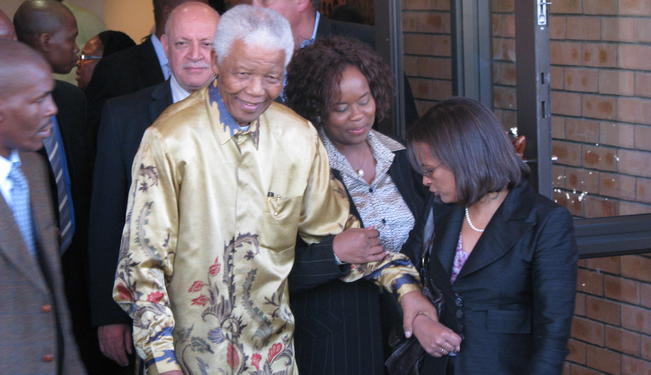Mandela has become a symbol of what one can achieve with true dedication to a cause.
Background
When Nelson Rolihlahla Mandela was born in 1918, South Africa was a country entirely different from what it is today. Since colonial times, people of color in South Africa were seen as second-class citizens despite the clear non-white majority.
In 1948, when the National Party (NP) was elected, it institutionalized racial segregation with a policy of “apartheid.” Public services, resources and even living areas were allocated based upon race. Anyone not classified as white had to deal with being treated as inferior.
Like no other, Mandela’s life had always been closely connected to the history of South Africa and the struggle for racial equality. Already before the NP came to power, Mandela had joined the African National Congress (ANC) which fought for the rights of South Africa’s non-white population. He quickly climbed the ladder of the party’s hierarchy and when apartheid was implemented, Mandela opposed it.
The more resistance against unequal treatment grew, the more the apartheid government tightened their grip. Mandela and some other leading ANC members were arrested multiple times. He was eventually sentenced to a lifetime in prison in the Rivonia Trial of 1964 and sent to the infamous Robben Island, where he would spend the next 20 years.
However, Mandela continued his struggle to end apartheid from within his cell and became a symbol of the fight for racial equality. He was seen as one of the world’s most famous prisoners, with people worldwide supporting his release.
The impression Mandela made on the world was not only due to the cause he was fighting for, but also because of the way he handled the consequences that came with the struggle. Even during his overall 27 years in prison, he maintained his poise and did not turn bitter. He was offered conditional release multiple times, but stayed true to his beliefs.
When he was finally released under internal and international pressure in 1990, the end of apartheid subsequently followed. And even after Mandela was elected as president of South Africa in 1994, he maintained a course that fostered reconciliation between different ethnic groups in the country rather than promoting revenge for all the years of oppression. He retired after one term in office, but remained politically active and engaged in the fight against HIV and Aids.
At the age of 95, Mandela passed away at his house in Johannesburg, South Africa on December 5, 2013.
Why is Nelson Mandela Relevant?
Over the years, the ANC may have lost some support amongst South Africans but “the father of the nation” never did. In all the years since he left office, Mandela remained one of the most well-known and beloved public figures in South Africa and beyond.
When news of his death reached the public, it spread like wildfire. The world collectively mourned and heads of states across the globe condoled. Meanwhile, South Africans gathered in front of Mandela’s house to express their grief over the loss of the country’s “greatest son,” as incumbent President Jacob Zuma had called him.
It now becomes clear that Mandela was more to South Africa and the world than just a former president. He has become a symbol of what one can achieve with true dedication to a cause, and a moral authority whose name inevitably stands tall alongside other freedom fighters, including Mahatma Gandhi and Martin Luther King Jr.
Without Mandela, South Africa will surely be a different country. However, his role in shaping the nation and the impression he made on the world will never be forgotten.
*[Note: This article was updated on December 9, 2013.]
For more than 10 years, Fair Observer has been free, fair and independent. No billionaire owns us, no advertisers control us. We are a reader-supported nonprofit. Unlike many other publications, we keep our content free for readers regardless of where they live or whether they can afford to pay. We have no paywalls and no ads.
In the post-truth era of fake news, echo chambers and filter bubbles, we publish a plurality of perspectives from around the world. Anyone can publish with us, but everyone goes through a rigorous editorial process. So, you get fact-checked, well-reasoned content instead of noise.
We publish 2,500+ voices from 90+ countries. We also conduct education and training programs on subjects ranging from digital media and journalism to writing and critical thinking. This doesn’t come cheap. Servers, editors, trainers and web developers cost money.
Please consider supporting us on a regular basis as a recurring donor or a sustaining member.
Support Fair Observer
We rely on your support for our independence, diversity and quality.
Will you support FO’s journalism?
We rely on your support for our independence, diversity and quality.








